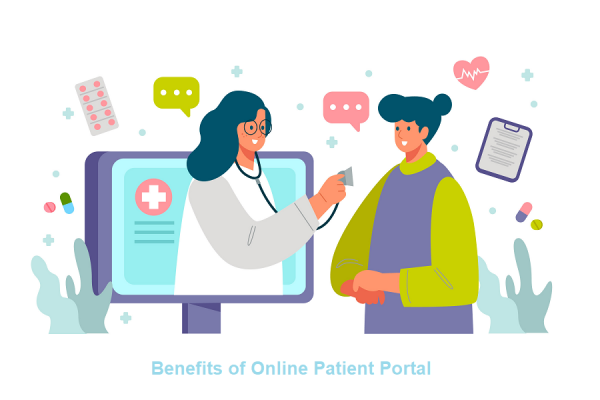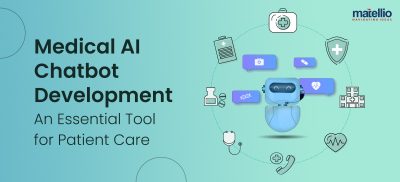
So, you have an idea regarding your online healthcare business – developing an online patient portal. What’s next? You might be wondering where to start! Well, if you have questions like cost of development, best features to include, platform selection, etc. in your mind, then you’re at the right place. Here in this article, we will be covering all the questions and other related aspects of patient portal development. So, let’s dive in!
With the introduction of digital tools like EHR Software, and electronic medical records (EMR Software), the utilization of patient portals thrived in recent times. Online patient portals improve the quality of care provided to the patients by setting up a bridge between the doctors and patients. Furthermore, it also enables the patients to access their health-related information seamlessly. According to a new ONC data brief, almost 52% of the users today are leveraging patients portals to access their health data. Not only that, but almost 87% of the doctors have adopted digital healthcare tools in the past few years.
What Are Patient Portals?

Patient portals are effective tools for the healthcare experts that aim to enhance the medical care facilities. It is a software application that enables the patients to access their healthcare records seamlessly even sitting in a remote location. It is basically an extension to the EHR (electronic healthcare records) system. Besides providing 24/7 online access to the patients, an effective patient portal also enables the healthcare experts to view lab results, radiology images, and diagnostic results of the patients seamlessly.
Additionally, the patient portal also facilitates better physician-patient communication to give the patients more control over their medical treatment. Some patient portals also make the heal;thcare services more effective for the patients by allowing them to pay bills, and schedule appointments directly through the system. Furthermore, the portal also benefits the providers by increasing patient engagement, promoting program loyalty, and by streamlining the workflows.
Still not convinced? Let’s look at some more amazing benefits of an online patient portal.
Benefits of Online Patient Portal
 No matter whatever platform you select, an effective online patient portal can enable your patients with secure access to their healthcare records. And, not to mention, it benefits the healthcare providers in the same way. Let’s head to some more benefits here in this section.
No matter whatever platform you select, an effective online patient portal can enable your patients with secure access to their healthcare records. And, not to mention, it benefits the healthcare providers in the same way. Let’s head to some more benefits here in this section.
1. Rapid Growth
As the medical industry has focused on patient-centred care, more and more healthcare providers have invested into patient portal development. Even patients enjoy the seamless access into their healthcare records. That’s why more and more patients today are signing-in the patient portal. A report by ONC reveals that almost 90% of the healthcare providers allow the patients to access their health care records. Not only that, but almost 25% of the patients actually enjoy these types of facilities. So, investing in patient portal development is indeed a profitable deal.
2. Increased Efficiency
It is often seen that implementing a patient portal in your healthcare business increases the efficiency of your office by allowing effective communication between the doctors and patients. The patients can, moreover, register themselves on the patient portal by entering their information electronically, whil;e eliminating the repetition of information time and again. That eventually reduces the errors that might occur when handling the patients past medical history manually. Additionally, the patients can check their diagnostic reports over the online platform and can even schedule the appointments using the patient portals. That, in turn, helps to eliminate the no-show conditions and allows your physicians to check more patients seamlessly.
3. Streamlined Workflow
Apart from increased efficiency and rapid growth, an online patient portal also makes your healthcare operations more smooth and streamlined. For instance, with an online appointment scheduling option, your receptionists or nurses would save a lot of time and can focus on more critical tasks related to your healthcare institute. Furthermore, if any patients needs an urgent healthcare consultation, then they could access that also by sending the doctor a direct message through an effective patient portal.
4. Telemedicine Promotion
You can even promote the culture of telemedicine through an efficient online patient portal. For instance, if any patient wants to consult the doctor regarding a change in medication, then they can simply utilize the telemedicine app to communicate with the doctor. Also, it would be beneficial for the patients that required an urgent consultation from the physicians. Using a patient portal, you can automate your the appointment process and can efficiently streamline the online prescription method.
5. Reduced Medical Errors
Last but not least, an amazing benefit of a patient portal is reduced human errors. It is often seen that when the nurses or receptionist records the information provided by the customer, then there are high chances that these records would contain some errors. And that can lead to serious medical issues related to the patient. That’s where an online patient portal comes into play! With patient portals, the patients directly send their healthcare issues, and likewise your staff can accurately predict their problems and needs. Furthermore, the integration of telemedicine apps into the patient portal can further help the doctors to provide an enhanced healthcare service to the patients. For instance, the software can seamlessly check for any drug-to drug or drug-to-allergy interactions that can occur with a prescribed medication before the doctor even fills out the prescription.
So, these were some of the amazing benefits of the patient portal that could compel anyone to invest in such a powerful technological tool. So, now that you are convinced enough, let us quickly see the steps to develop a patient portal app. But before that, let us discuss some points that you should consider while developing a patient portal app.
How to Evaluate Your Patient Portal Software Capabilities?
Now that there are ample of options that are available in the global market, it is tough to select an effective patient portal that best fits your business needs. For instance, you can select a patient portal offered by a third-party vendor, but that could cause integration issues with your EMR, and EHR software. Alternatively, you can also opt for a custom patient portal development. A good news is that when you opt for an EHR development, patient portals come with it as a service. But, while opting for a custom development, you need to consider few points like:
1. Development cost
First and foremost, you need to ensure that the custom patient development is cost-effective and flexible enough to best fit your healthcare needs and wants. Ensure that the software development is not too expensive than the normal rates. Although, the development cost may vary from place to place and also with the standard of the company. For instance, the develop of patient portal would eventually cost a bit higher in the USA as compared to a development company of Asiain region. However, you should also check that many of the not-so-trusted companies also quote very less to lure the customers. Hence, you should check the feasibility and trustworthiness of the software engineering firm you are planning to select for your project development.
2. Customizations
Second most crucial aspect that you need to address while opting for a custom patient portal development is the customization. Well, we all are well aware that a customized software application always proves very profitable for any sort of business irrespective of its niche. That’s why ensure that your strategic development partner offers enough customization options to make the patient portal software perfect for your healthcare institute. You can even mention all the features and functionalities that are in your mind regarding the patient portal development during the consultation process.
3. Features
Next big vital thing to consider is features of your patient portal software. Features are the most critical aspect of any sort of software application. If you do not have enough features for your patients, your staff, or even for yourself, then the app is of no use to you and your business. Hence, to make your work more simple, we have listed out some critical features that you can include in your patient portal software. Let’s check those out!
-
Profile Creation
You patients or even the doctors could seamlessly register themselves on the patient portal using this robust feature by entering their personal and demographic details.
-
Medical History
The patients can log in their medical history and can specify the allergies from a particular drug. The doctors can utilize this vital information to efficiently provide better healthcare to the patients.
-
Information Access
You can allow your patients to access all their health related information like diagnostic reports, lab reports, and the prescriptions of the physicians seamlessly.
-
Schedule Appointments
The users can book an appointment with their physicians using this robust feature.
-
Messaging Options
Apart from consulting the doctors physically, the patients can even communicate with the doctors over their change in medications, or regarding a test report via this functionality.
-
Real-time Notifications
An effective patient portal enables the admins to send all the updates and vital information regarding the software to its users in real-time.
-
Third-Party Integrations
You can seamlessly integrate other powerful software applications like telemedicine apps, EHR software, and so on in your patient portal software.
-
Online Payments
Let your patients pay for the healthcare services they have utilized through an online secured platform by utilizing digital payment methods seamlessly.
-
Registration Forms
The patients can easily fill out the registration forms online, or can even download the form in an offline mode.
-
Educational Materials
Lastly, the patient portal should also include enough educational content for the users to make them aware about any particular disease or infection.
4. Patient Access
Patient access is another crucial aspect that you should look at while developing a patient portal software. You need to check whether the patient module provides enough support to the patient management process. Also, you need to make sure that the patient portal software covers all the vital features necessary for your patients. At last, it’s a good idea to check the accessibility of the patient portals by logging in as patients through multiple devices.
5. Usability and Navigation
Usability is always a vital aspect for almost all the software applications, and mobile apps. Meaning, if you have all the features but it is not clear to the user, or in other words, the features and user-interface is not designed to provide ease to the user, then you may fail dramatically in the global market. Your users will not find your product useful even if you have all the functionalities for them. So, pay attention to the UI/UX aspect of your patient portal software development and design the interface as simple and effective as possible.
6. Security
Security is a widespread issue that has been trending in the global market for quite a long time now. Many applications and mobile apps have been hacked by the fraudsters due to leaks in software applications. That’s why you should pay a great attention to the security aspect while developing your patient portal software. Meaning, you should try to inculcate all the relevant security tools and systems that can help you secure your application from malware attacks and hackers. Want to know more about application security? Get all the information here in this article.
7. Online Support
Last but not least is the online support form your trustworthy strategic development partner. It is no surprise that the patient portal software is evolving continuously with time, and no EHR system can meet all those constant changes. Hence, it should be your duty to constantly upgrade your system. Also, you should provide adequate training to your healthcare staff before implementing patient portal software in your office. Additionally, you need to check whether your partner provides upgradation and if yes, then in what intervals of time.
Read: Role of Mobile Apps in Healthcare and Medical Industry
How to Develop an Online Patient Portal?
So, here we are at the most awaited section of our article – how to develop an online patient portal. Hence, without wasting any further, let’s quickly dive in!
1. Analyze your Target Audience
First and foremost, before developing any sort of software application, you need to analyze your target audience. For instance, there are many groups that are available in the global market such as, Generation X, Millennials, and Gen Z. And we all know that all sorts of people readily utilize the digital healthcare solutions to improve their health or to consult the doctor. So, make sure that your custom software has all the features and user-friendly functionalities that could enable the people to use your software efficiently.
2. Select a Suitable Technology
The next step is to se;lect a proper technology that could make your software even more advanced and effective. Now, thanks to the digital era that we live in, we have amp;le of technologies that could be beneficial to patient postal software. For instance, you can leverage AI and ML technology to make your patient portals more effective. Also, you can leverage voice-assistants to make it useful for the physically-challenged people.
3. Pay Heed to Regulatory Compliances
Regulatory compliances is the most critical thing that you will have to address while developing any sort of software. And when it comes to digital healthcare solutions, then it automatically becomes a thing of utmost importance. So, remain adhere to all the state laws and regulations and stick to the HIPAA compliance to make your software application secure and popular in the global market.
4. Hire a Dedicated Development Team
Hiring a dedicated development team is often a difficult task as described by many marketers, but, it is critical as well! Before beginning with the patient portal development, you need to have a dedicated team of front-end developers, back-end developers, testers, etc. in your team. You can even go for full-stack developers or mean-stack developers that could potentially reduce the cost of hiring two different programmers for front-end and back-end development. Now, here you have two choices, either go for an in-house development team, that can be a little expensive for developing a single project, or to outsource developers from an experienced software engineering firm.
Although both the options have their specific perks, outsourcing the development team is always considered a wise decision when developing a product. There are many reasons for that, but to be precise, an experienced development company has complete knowledge of how to tackle all the issues that may come during the patient portal development. Furthermore, the expert software engineers of that company can even provide you out-of-the-box ideas to outgrow your competitor and build success for your healthcare organization. Want more reasons? Here are some top benefits of outsourcing an experienced software engineering firm for your next project.
5. Test and Deploy
The last step after the development of your patient portal software is to test the product in and out. You need to ensure that every feature and functionality is built according to your expectation, and the software works efficiently. Now for that also, you could either ask your development partner whether they provide the testing facility or not. Furthermore, it is a wise decision to go for an automated testing method as it can effectively reduce the errors and can efficiently test your product with automated tools and systems.
What are the costs involved in patient portal development?
So, you have got an idea of the development process, and now you are interested to know about the total cost that is involved with the patient portal development. Well, like every other on-deamnd solution, the cost of developing a scalable and feature-rich patient portal software also depends on some critical factors. To name a few, we have:
1. Development Cost
The cost involved with the developers plays a critical role in calculating cost for the patient portal development. Meaning, if you select two different engineers for front-end and back-end development, it would cost more than selecting a full-stack developer.
2. Features Opted
The number of features in your software application also plays a crucial role in determining the cost of your software solution. As an experienced software engineering firm, we always advise our clients to firstly opt for the basic features and then slowly upgrade to the advanced features.
3. Managerial Cost
The cost associated with the consultation and document creation, and with the Project Manager, would also be counted during the software development. An experienced software engineering firm always provides you a project manager to keep things in flow.
4. Customizations
If you’ve opted for any customizations then the charges would also add up to your development cost. Although, if the customizations are too small, then it may be neglected, if it is way beyond different then it may cost you a little.
5. Testing Cost
Testing cost also affects the overall development cost. Your product would be tested under different models and devices to ensure smooth functioning of the product.
Apart from all the mentioned costs, there are many other parameters that could affect the development cost. You can request a quote to get an accurate estimate of your product development.
Let’s Develop Patient Portals With Matellio!
At last, we can say that the world is evolving at a faster speed. What once was considered as a fiction has now emerged as a robust tool in the global market. The needs of the customers are changing and so are the industries, and the healthcare sector is no exception. So, whether you want to know more, or you are planning to develop custom healthcare solutions, you can seamlessly contact us anytime you want. Our experts will always be there for you to solve your issues. We have years of experience in developing custom healthcare solutions and we have multiple portfolios and projects to show your expertise. Reach us at www.matellio.com to book a free 30-min consultation today!



